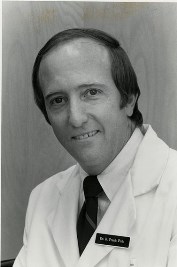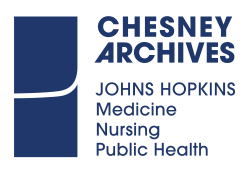Biography
Frank Polk was born in San Angelo, Texas in 1942. Polk received his B.A. from the University of Texas at Austin in 1963, his M. D. from Baylor College of Medicine in 1967; and his M. Sc. from Harvard University School of Public Health in 1976. Polk was a resident at St. Luke’s Hospital in New York and at Peter Bent Brigham Hospital in Boston. During the 1970s, he was an Assistant Professor of Medicine at Harvard Medical School and a physician at several hospitals in the Northeast including Boston City Hospital, Beth Israel Hospital, Boston Hospital for Women, New England Deaconess Hospital, and Brigham and Women’s Hospital in Boston. During this time he taught courses on Infectious Disease and served on Infection Control Committees.
Read More >
Polk held appointments at Johns Hopkins University from 1982 until his death in 1988. From 1982 until 1985 he was an Associate Professor of Epidemiology in the Department of Epidemiology within the School of Hygiene and Public Health. He held a joint appointment in the School of Medicine, as Associate Professor of Medicine in the Department of Medicine and in the Department of Obstetrics and Gynecology. From 1985 until 1988 Polk was a Professor in each of the three Departments and the Director of the Infectious Disease Epidemiology Program in the Department of Epidemiology at the School of Hygiene and Public Health. He taught courses on Epidemiology, Reproductive and Perinatal Disorders, and AIDS.
Polk conducted research on reproductive disorders, hypertension, cancer and nutrition, and AIDS. While at Harvard he cared for one of Boston’s first AIDS patients. Polk was a key figure in the early efforts at Johns Hopkins Medical Institutions to address AIDS as a public health threat and to provide treatment for AIDS patients. Early on he recognized and warned of the possibility of an epidemic. In 1983 he designed a study to follow the natural history of the disease among gay and bisexual men. The National Institute of Allergy and Infectious Diseases, within NIH, selected Polk’s project, which became known as “the Study to Help the AIDS Research Effort (SHARE),” to be the Baltimore site of the longitudinal Multicenter AIDS Cohort Study (MACS). In forming SHARE’s advisory board, Polk approached members of the gay community of Baltimore in order to obtain advice about recruitment, publicity, interviewing, confidentiality and other matters about which sensitivity regarding gay lifestyle was important, but which researchers may not have understood. MACS is still ongoing; in addition to Baltimore, it includes sites in Chicago, Pittsburgh and Los Angeles.
Polk was an Advisory Board Member of the First AIDS Service at Johns Hopkins University, the clinical care component of the Johns Hopkins Hospital for serving AIDS patients. In 1984 he established the Outpatient Clinic for patients with HIV infection. Located at the Moore Clinic, it was the first AIDS Clinic in Maryland. Polk served as the director and provided evaluation, treatment, and counsel. In 1986 Polk helped initiate the Hospital’s AIDS Inpatient Unit, the 3rd in the country at the time. Polk conducted studies on AIDS transmission and treatment including the risk of HIV infection for recipients of blood transfusions, prison inmates, intravenous drug users, and transmission from mothers to their unborn child. He conducted early studies of experimental drug treatments.
Polk was concerned with both immunological and social issues. He was an advocate of AIDS education. He conducted seminars for Baltimore city school principals and collaborated with Maryland Public Television in developing an AIDS video. During the early years of the disease’s discovery he encouraged public officials to keep schools open to AIDS patients. He was an early advocate of clean needle exchange programs for IV drug users. Polk served on scientific task forces for the state of Maryland as well as numerous committees and advisory councils pertaining to Obstetrics and Gynecology and AIDS. He co-authored more than 100 scientific articles. He died of a brain tumor in 1988 at the age of 46. In 1989 the AIDS inpatient unit at Johns Hopkins Hospital was named after Polk.
< Read Less
Scope and Content
The B. Frank Polk Collection consists of Polk’s teaching and course files, correspondence, committee files, research materials, and publications relating to his work as a faculty member at The Johns Hopkins University School of Public Health in the Department of Epidemiology and at the School of Medicine in the Departments of Medicine and Gynecology and Obstetrics. The papers document the leadership role Polk played as part of the effort at the Johns Hopkins Medical Institutions to prioritize, understand, and treat patients with AIDS in the years following the appearance of the disease. Polk was active in the creation of an AIDS Treatment Unit at the Johns Hopkins Hospital. The collection includes Polk’s research files in Obstetrics and Gynecology and his research on AIDS transmission and treatment. It includes records pertaining to a longitudinal AIDS Study, MACS, the Multicenter AIDS Cohort Study. Polk was the principle investigator for SHARE (Study to Help the AIDS Research Effort), the Baltimore arm of the MACS study. The collection contains an extensive set of reprints of articles co-authored by Polk. Additional material related to Polk’s research studies, the Multicenter AIDS Cohort Study (MACS) and the Study to Help the AIDS Research Effort (SHARE), can be found in the SHARE records maintained as part of the Medical Archives records management program.
Catalog Record
Policy on Access and Use
Permissions and Credits

